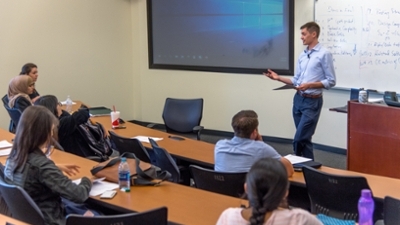Auburn Engineering faculty awarded subcontract for U.S. Department of Defense work
 |
| Mark Schall, a faculty member in the Department of Industrial and Systems Engineering, is the principle investigator of the research project to develop a system to improve motion capabilities of exoskeletons to reduce injuries and fatalities of military personnel. |
Three faculty members in Auburn University's Samuel Ginn College of Engineering have been awarded a subcontract as part of a Rapid Innovation Fund award sponsored by the U.S. Department of Defense.
Mark Schall of the Department of Industrial and Systems Engineering along with Michael Zabala and David Bevly of the Department of Mechanical Engineering have partnered with human performance assessment firm Aptima, Inc. to develop a system to improve the motion capabilities of exoskeletons through a sensor suite integrated into a textile base-layer suit. The goal is to improve performance and decrease operator fatigue, reducing injuries and fatalities of military personnel.
"Our team is very excited and honored to have been selected to work on this project that aims to assist and protect our nation's servicemen and women," Schall said.
According to the project abstract, the system will use electromyography, inertial measurement units and pressure sensors to detect human intent with respect to motion, as well as pose tracking of the exoskeleton operator and ground contact forces. In addition, the system will augment exoskeleton movement and control, while also ensuring constraints such as weight, power, data storage and transmission, and limited calibration are met. The system also will use data-fusion and transmission techniques to ensure data availability for the mission observers and will be developed with transition and interoperability in mind, with the developed technology facilitating seamless transition to existing exoskeleton systems.
"The technology developed through this effort will also have applications in fields such as rehabilitation and occupational health and safety that will help countless Americans live happier, healthier lives," Schall said.
The work has been sponsored by the U.S. Army Research Office under Contract W911NF-17-C-0062.
Media Contact: , nelsoc4@auburn.edu, 334.844.3447
Mark Schall Teaching





